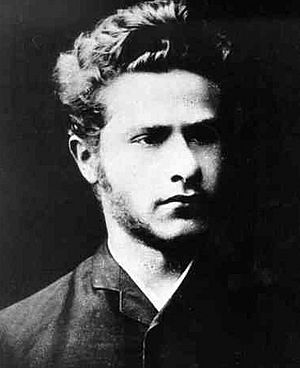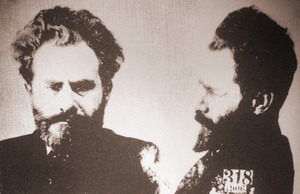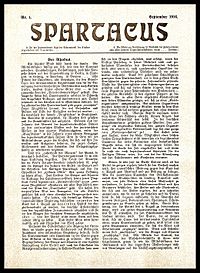Leo Jogiches facts for kids
Quick facts for kids
Leo Jogiches
|
|
|---|---|
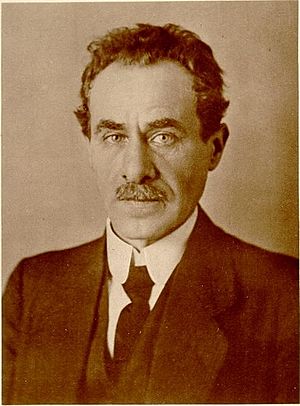 |
|
| Born |
Leon Jogiches
17 July 1867 |
| Died | 10 March 1919 (aged 51) |
| Other names | Jan Tyszka |
| Known for | Marxist revolutionary |
| Partner(s) | Rosa Luxemburg |
| Signature | |
Leon "Leo" Jogiches (born July 17, 1867 – died March 10, 1919) was a Polish revolutionary and politician. He was active in Poland, Lithuania, and Germany. He was also known by his party name, Jan Tyszka.
Jogiches helped start the Social Democracy of the Kingdom of Poland and Lithuania political party in 1893. This party was a key part of what later became the Communist Party of Poland. During World War I, he was also important in the secret Spartacus League in Germany. This group later became the Communist Party of Germany.
For many years, Leo Jogiches was a close friend and political partner of the famous revolutionary Rosa Luxemburg. He was killed in Berlin in March 1919. This happened while he was looking into Rosa Luxemburg's murder, which had happened a few weeks before.
Contents
Early Life and Activism
Leon Jogiches was born on July 17, 1867. His family was wealthy and Polish-Jewish. He was born in Vilnius, which is now in Lithuania. At that time, it was part of the Russian Empire. We don't know much about his early childhood. However, he spoke mostly Polish at home and Russian outside.
When he was 18, Jogiches started one of the first secret socialist study groups in Vilnius in 1885. This was before the first big socialist group in the Russian Empire began. He used the name Liofka, which means "little Leo." He became well-known for his strong dedication to fighting against the Tsar, who was the ruler of Russia. Because of this, he was arrested twice, in 1888 and 1889, and spent short times in jail.
Moving to Zurich
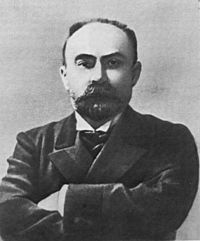
Jogiches faced the risk of being forced into the Tsar's army. So, he escaped to Zurich, Switzerland. He took a lot of money with him. Some of it was his own, and some was given to him to print and share socialist writings. A few months after arriving in Zurich, 23-year-old Jogiches met Rosa Luxemburg. She was 20 and also a political refugee from the Tsar's rule. They fell in love and became close political partners and friends.
Soon after arriving in Switzerland, Jogiches met Georgy Plekhanov. Plekhanov was a pioneer of Russian Marxism. Jogiches suggested they work together to publish radical books. Jogiches would provide money and publishing skills. Plekhanov would provide his fame and rights to books by Karl Marx and Frederick Engels.
Jogiches suggested they split the profits 50-50. Plekhanov quickly said no. This caused a lasting coldness between them. But Jogiches didn't give up. He started his own publishing house in 1892. It was called The Social-Democratic Library. He published books by Marx and others without permission. This made his relationship with Plekhanov even worse.
Because of this fight with Plekhanov, Jogiches and Luxemburg became somewhat isolated. Jogiches then focused on Polish issues for several years. In July 1893, Jogiches funded a new Polish language socialist newspaper in Paris. It was called Sprawa Robotnicza (The Workers' Cause). This paper stressed that Polish and Russian radicals should work together. Their goal was to overthrow the Tsar. They also believed in internationalism, meaning workers everywhere should unite. Rosa Luxemburg wrote a lot for this paper and soon became its editor.
The paper's internationalist ideas were different from the Polish Socialist Party (PPS). The PPS focused more on Poland becoming free from Russian control. So, the PPS leaders did not support the paper. In August 1893, Luxemburg tried to attend a big socialist meeting in Zurich. The PPS challenged her right to be there. She was not allowed to join the meeting. This made the bad feelings between Jogiches, Luxemburg, and the PPS even stronger.
Later in 1893, Jogiches and Luxemburg took another step. They started a new Marxist political party. It was called the Social Democracy of the Kingdom of Poland (SDKP). This group later became known as the Social Democracy of the Kingdom of Poland and Lithuania (SDKPiL). This new group was separate from the PPS.
The 1905 Revolution
The Russian Revolution of 1905 started suddenly on "Bloody Sunday," January 22. Hundreds of peaceful protesters were shot while trying to give a petition to Tsar Nicholas II. Within days, protests and strikes spread across the empire. People demanded a new government with a constitution. This shook the government for months.
At first, Leo Jogiches and Rosa Luxemburg stayed in Germany. They focused on the German movement. Jogiches returned to Warsaw in Poland in the spring of 1905. There, he helped set up the Central Committee of the SDKPiL. He worked with Julian Marchlewski, Adolf Warski, Felix Dzerzhinsky, and Yakov Hanecki. Luxemburg stayed in Berlin. She represented the SDKPiL abroad. She tried to get support for their group from German socialists. In Germany, Luxemburg pushed for the idea of a "mass strike." She saw it as a way to gain power, based on the Russian experience.
Jogiches later returned to Germany. He attended the annual meeting of the SPD in September 1905. In the fall of 1905, Luxemburg joined the editorial board of the party's newspaper, Vorwärts (Forward). She wrote many articles about events in Russia. She tried to show how the Russian situation was similar to Germany's. On December 28, 1905, she traveled to Warsaw in Russian Poland. She wanted to join the revolution against the Tsar's government directly.
In March 1906, Luxemburg and Jogiches were arrested for their revolutionary work. Jogiches was sentenced to 8 years of hard labor and exile to Siberia. He spent months in prison. But he managed to escape across the border to Berlin.
Jogiches attended a meeting of the Russian Social Democratic Labour Party in London in 1907. There, he was chosen as a candidate member for the party's main committee.
Working Apart from Luxemburg
Leo Jogiches was a smart person and a dedicated revolutionary. But he found it very hard to write down his ideas. Rosa Luxemburg once said, "the mere thought of putting his ideas on paper paralyzes him." So, Jogiches' main role was to inspire Luxemburg's writing. He also organized the new underground political party he helped create.
As Luxemburg became more famous as a Marxist writer, Jogiches grew more unhappy. By his mid-30s, he felt disappointed that his life hadn't met his early hopes. This led to personal conflicts. They separated in 1907. However, they continued to work together politically, even though their personal relationship ended.
Around 1909, Jogiches worked with Vladimir Lenin, a Bolshevik leader. He supported Lenin in trying to control the Russian Social Democratic Labour Party. Jogiches gained control of some party money. He tried to use this to unite different groups of socialists. But Lenin outsmarted him and took control of the money. This caused a bitter split between Lenin and Jogiches.
The Spartacus League
On August 4, 1914, the members of the Social Democratic Party of Germany (SPD) in parliament voted together. They supported a bill that allowed the government to spend money on World War I. This was a big change from what international socialists believed. It shocked radical members of the party, including Jogiches. Rosa Luxemburg wanted to publish a secret message. It would be signed by anti-war leaders of the SPD. It would call for people to resist the war. Jogiches thought this was not enough for real political organizing.
Rosa Luxemburg and her friends, including Leo Jogiches, began to organize secretly in 1914 and 1915. They included Julian Marchlewski, Franz Mehring, Clara Zetkin, and Wilhelm Pieck. They wanted to connect with socialists in other countries. They wrote letters to Swiss socialist newspapers. They spoke out against the war. They linked the fight for peace with the fight for workers' rights.
The government noticed these anti-war activities. They arrested Karl Liebknecht, an anti-war politician, in February 1915. They moved him between military units to stop his influence. Luxemburg was also arrested later that month and held for eight weeks. The government tried to stop anti-war feelings by arresting leaders and banning anti-war writings. But they did not succeed completely. More than 1,000 women protested for peace in front of the Reichstag in May 1915. This made the government even more worried.
The radical group worked hard to find supporters everywhere. By mid-1915, they were in contact with people in over 300 places. They held a meeting in May 1915 to plan a secret network of anti-war activists within the SPD. The group started its own newspaper, Die Internationale (The International). Luxemburg and Mehring edited it. But it was immediately banned. However, this short-lived paper gave the growing underground group a name: the Internationale group.
The Internationale group held another meeting on January 1, 1916. Twelve delegates attended. They adopted a plan written by Rosa Luxemburg from prison. The group did not want to form a new political party right away. They believed the SPD's system needed to become more democratic. They wanted to remove pro-war leaders. They hoped to create a large revolutionary party for a future national revolution.
After Liebknecht was jailed in May 1916 and Luxemburg in July, Jogiches took over leading the underground group. As leader, Jogiches oversaw the publication of their official newsletter, Spartacus. It started in September 1916. This gave the group a new name: the Spartakusbund, or Spartacus League.
While the revolutionary left wanted to change the SPD from within, the pro-war majority of the SPD worked to remove them. In May 1916, 33 SPD members of parliament were expelled for opposing the war. In October, the pro-war leaders took control of the newspaper Vorwärts. A national meeting of socialist dissidents was held in Berlin in January 1917. Many members of the Spartakusbund attended. This meeting was seen as an attempt to "sabotage" the SPD. Many leftists were then expelled.
The arguments and expulsions led to a formal split in the SPD. A new party, the Independent Social Democratic Party of Germany (USPD), was formed in April 1917. About 170,000 members stayed with the old SPD. The new USPD had 120,000 members, including Jogiches and the Spartakusbund.
Jogiches continued to lead the underground Spartacus group until his own arrest in Berlin on March 24, 1918. After his arrest, Paul Levi took over leadership of the Spartacus League. The Spartakusbund later became a main force in forming the Communist Party of Germany (KPD) at the end of 1918.
Assassination
The Spartacus League led an uprising that failed. After this, Luxemburg and Liebknecht were killed by right-wing paramilitary groups called Freikorps. Jogiches was killed in Moabit prison in Berlin on March 10, 1919. He was likely killed because he was investigating the murders of Luxemburg and Liebknecht.
Pseudonyms
Throughout his life as a secret revolutionary, Jogiches used many different names. His most common Polish name was Jan Tyszka. He also used names like "Grosovsky," "Johannes Kraft," "Otto Engelmann," and "Krumbagel."
See also
 In Spanish: Leo Jogiches para niños
In Spanish: Leo Jogiches para niños
 | Madam C. J. Walker |
 | Janet Emerson Bashen |
 | Annie Turnbo Malone |
 | Maggie L. Walker |


